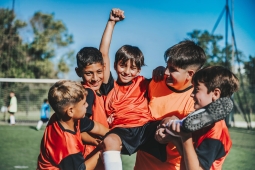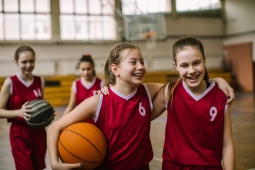[ Feature Article ] In May 2024, PHE Canada hosted the PHE Thinkers Gathering in Saskatoon, bringing together 100+ leaders to address a key challenge in education. This year’s focus was on boys and young men struggling in schools. PHE Canada is committed to fostering empathy, accountability, and resilience in boys while promoting gender equity and social justice. Changing the narrative on masculinity requires collective reflection and action.
[ Feature Article ] "The Power of Play" explores the potential of intramurals as a key solution to increasing student participation in physical and social opportunities to promote holistic development for all students. Unlike interschool sports, intramurals provide inclusive, low-pressure physical activities that engage a broader range of students. By offering accessible programs, intramurals can enhance physical health, mental well-being, and social connections, while fostering a sense of belonging and school spirit. With only 39% of youth meeting physical activity guidelines, well-structured intramural programs may be the missing link in improving both physical and emotional outcomes in schools.
[ Feature Article ] As we work towards decolonizing our classrooms and responding to the Truth and Reconciliation Commission of Canada’s calls to action, we have identified three key strategies for fostering a more inclusive pedagogy in physical education, (a) adopting the medicine wheel to communicate classroom expectations, (b) building connections to the land through outdoor teaching and learning, and (c) integrating oral story telling into instructional practice. We hope this article provides teachers with actionable pathways to create a holistic, safe, and inclusive physical education environment that honours Indigenous perspectives.
[ Feature Article ] New Year’s resolutions often reinforce harmful body image standards and diet culture, but educators have a unique role in promoting body diversity and dismantling weight stigma. By fostering inclusive, weight-neutral classrooms, teachers can encourage students to critically analyze social media messaging, trust their bodies, and adopt holistic wellness practices. Practical strategies include exploring non-physical traits, creating courage cards, and engaging in digital literacy discussions. Supporting students with weight-neutral approaches and SMART goal setting can shift the focus from dieting to celebrating body diversity and fostering positive self-esteem.
[ Research ] Service learning can facilitate learning how to promote physical activity and health to children. Mixed methods examined students’ perceived awareness, knowledge, confidence, attitude, and control in promoting physical activity and health to children in an after-school program, Fit 4 Life. This paper shares results from three interrelated studies related to university student learning about physical activity and health promotion with children.






